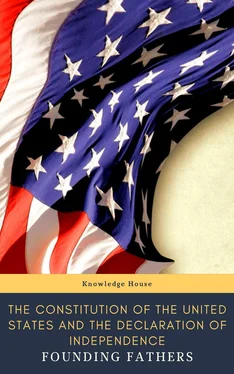The institutions chiefly alluded to are standing armies, and the correspondent appendages of military establishments. Standing armies, it is said, are not provided against in the new Constitution; and it is therefore inferred that they may exist under it.15 Their existence, however, from the very terms of the proposition, is, at most, problematical and uncertain. But standing armies, it may be replied, must inevitably result from a dissolution of the Confederacy. Frequent war and constant apprehension, which require a state of as constant preparation, will infallibly produce them. The weaker States or confederacies would first have recourse to them, to put themselves upon an equality with their more potent neighbors. They would endeavor to supply the inferiority of population and resources, by a more regular and effective system of defence, by disciplined troops, and by fortifications. They would, at the same time, be necessitated to strengthen the executive arm of Government; in doing which, their Constitutions would acquire a progressive direction towards monarchy. It is of the nature of war to increase the executive at the expense of the legislative authority.
The expedients which have been mentioned would soon give the States or confederacies that made use of them, a superiority over their neighbors. Small States, or States of less natural strength, under vigorous Governments, and with the assistance of disciplined armies, have often triumphed over large States, or States of greater natural strength, which have been destitute of these advantages. Neither the pride, nor the safety, of the more important States, or confederacies, would permit them long to submit to this mortifying and adventitious superiority. They would quickly resort to means similar to those by which it had been effected, to reinstate themselves in their lost preëminence. Thus we should, in a little time, see established in every part of this country the same engines of despotism which have been the scourge of the old world. This, at least, would be the natural course of things; and our reasonings will be the more likely to be just, in proportion as they are accommodated to this standard.
These are not vague inferences drawn from supposed or speculative defects in a Constitution, the whole power of which is lodged in the hands of a people, or their representatives and delegates, but they are solid conclusions, drawn from the natural and necessary progress of human affairs.
It may perhaps be asked, by way of objection to this, why did not standing armies spring up out of the contentions which so often distracted the ancient republics of Greece? Different answers, equally satisfactory, may be given to this question. The industrious habits of the people of the present day, absorbed in the pursuits of gain, and devoted to the improvements of agriculture and commerce, are incompatible with the condition of a nation of soldiers, which was the true condition of the people of those republics. The means of revenue, which have been so greatly multiplied by the increase of gold and silver and of the arts of industry, and the science of finance, which is the offspring of modern times, concurring with the habits of nations, have produced an entire revolution in the system of war, and have rendered disciplined armies, distinct from the body of the citizens, the inseparable companion of frequent hostility.
There is a wide difference, also, between military establishments in a country seldom exposed by its situation to internal invasions, and in one which is often subject to them, and always apprehensive of them. The rulers of the former can have no good pretext, if they are even so inclined, to keep on foot armies so numerous as must of necessity be maintained in the latter. These armies being, in the first case, rarely, if at all, called into activity for interior defence, the people are in no danger of being broken to military subordination. The laws are not accustomed to relaxations, in favor of military exigencies; the civil state remains in full vigor, neither corrupted, nor confounded with the principles or propensities of the other state. The smallness of the army renders the natural strength of the community an overmatch for it; and the citizens, not habituated to look up to the military power for protection, or to submit to its oppressions, neither love nor fear the soldiery; they view them with a spirit of jealous acquiescence in a necessary evil, and stand ready to resist a power which they suppose may be exerted to the prejudice of their rights. The army under such circumstances may usefully aid the magistrate to suppress a small faction, or an occasional mob, or insurrection; but it will be unable to enforce encroachments against the united efforts of the great body of the people.
In a country in the predicament last described, the contrary of all this happens. The perpetual menacings of danger oblige the Government to be always prepared to repel it; its armies must be numerous enough for instant defence. The continual necessity for their services enhances the importance of the soldier, and proportionably degrades the condition of the citizen. The military state becomes elevated above the civil. The inhabitants of territories, often the theatre of war, are unavoidably subjected to frequent infringements on their rights, which serve to weaken their sense of those rights; and by degrees the people are brought to consider the soldiery not only as their protectors, but as their superiors. The transition from this disposition to that of considering them as masters, is neither remote nor difficult: but it is very difficult to prevail upon a people under such impressions, to make a bold or effectual resistance to usurpations supported by the military power.
The kingdom of Great Britain falls within the first description. An insular situation, and a powerful marine, guarding it in a great measure against the possibility of foreign invasion, supersede the necessity of a numerous army within the kingdom. A sufficient force to make head against a sudden descent, till the militia could have time to rally and embody, is all that has been deemed requisite. No motive of national policy has demanded, nor would public opinion have tolerated, a larger number of troops upon its domestic establishment. There has been, for a long time past, little room for the operation of the other causes, which have been enumerated as the consequences of internal war. This peculiar felicity of situation has, in a great degree, contributed to preserve the liberty which that country to this day enjoys, in spite of the prevalent venality and corruption. If, on the contrary, Britain had been situated on the continent, and had been compelled, as she would have been, by that situation, to make her military establishments at home coextensive with those of the other great powers of Europe, she, like them, would in all probability be, at this day, a victim to the absolute power of a single man. ’Tis possible, though not easy, that the people of that island may be enslaved from other causes; but it cannot be by the prowess of an army so inconsiderable as that which has been usually kept up within that kingdom.
If we are wise enough to preserve the Union, we may for ages enjoy an advantage similar to that of an insulated situation. Europe is at a great distance from us. Her colonies in our vicinity will be likely to continue too much disproportioned in strength, to be able to give us any dangerous annoyance. Extensive military establishments cannot, in this position, be necessary to our security. But if we should be disunited, and the integral parts should either remain separated, or, which is most probable, should be thrown together into two or three confederacies, we should be, in a short course of time, in the predicament of the continental powers of Europe–our liberties would be a prey to the means of defending ourselves against the ambition and jealousy of each other.
Читать дальше












